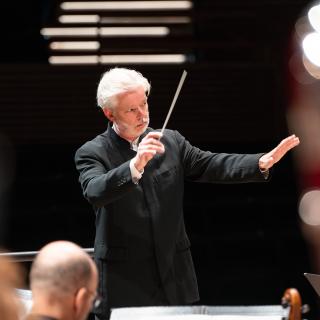The tour in Spain continues to Madrid.
“As if God the Father had thrown down pieces of a mosaic from the floor of heaven and asked me to work out the pattern", wrote Jean Sibelius in his diary in April 1915. His fifth symphony, one of the composer's most beloved, was born from heavenly building blocks.
Sergei Rachmaninoff: Piano Concerto No. 3 in D Minor, Op. 30
On his death in California 1943, the press hailed Russian emigrant Sergei Rachmaninoff as one of the greatest pianists of his day. His position as a composer was, however, open to dispute, for the Modernist camp looked askance at his flowing, melodic, romantic style. He wrote his third piano concerto during his summer holiday in 1909 and was naturally the soloist at its premiere that autumn in New York.
Regarded by Rachmaninoff as the best of his four concertos, no. 3 is dedicated to the pianist Josef Hofmann, who never actually played it because, like many others with the exception of Vladimir Horowitz, he found the solo part too heavy and difficult. The concerto would later become increasingly popular among world virtuosos and in the 1990s acquired cult status thanks to the mega-hit movie Shine.
The first movement is a melodic horn of plenty and has a cadenza big enough to qualify as a symphonic piano piece in its own right. The second, Intermezzo, is in melancholy mood and leads without a break to the finale.
Jean Sibelius: Symphony No. 5, Op. 82
Composing did not come easily to Jean Sibelius (1865–1957); he was well over 20 before he completed any of his major works and was silent for the last few decades of his life. He premiered three different versions of his Symphony No. 5 between 1915 and 1919, each one more compact than the last. His biggest problem was the final build-up, and he solved it by cutting off the soaring theme as if with an axe. Some hear this as a climber facing a precipice at the top of a mountain, others as the despair of a composer who has reached an impasse.
The symphony is a mighty drama for the brass section from the very first bars right through to the finale inspired by flying swans. In retrospect, it is easy to see the fifth as one stage in a logical, unbroken line running right through his symphonies. Whereas the themes and movements of the earlier symphonies are more clear-cut and independent, the fifth is a major step towards the symphonic unity of the sixth, culminating in the one-movement seventh of 1924.
Nelson Goerner
Pianist Nelson Goerner (born 1969 in Argentina) is internationally established as a recitalist, chamber musician, and soloist with leading orchestras. The French newspaper Le Monde described him as ’the master goldsmith at the piano’.
After winning First Prize in the Franz Liszt Competition in Buenos Aires in 1986, Goerner studied with Maria Tipo at the Geneva Conservatoire, and in 1990 he took First Prize at the Geneva Competition. Nelson Goerner resides in Switzerland.
In 2024–2025, Goerner’s career takes him to Europe, Japan, South Korea, the United Kingdom, and the United States. Following the two concerts featuring Rachmaninoff and Sibelius at the Musiikkitalo, Nelson Goerner, together with the Helsinki Philharmonic Orchestra and Jukka-Pekka Saraste, will perform the same programme in Madrid and Zaragoza during the orchestra’s Tour of Spain. This season, Goerner will play Rachmaninoff’s Piano Concerto No. 3 under the baton of Fabio Luisi with the Dallas Symphony Orchestra, and the NHK Symphony Orchestra, as well.
Jukka-Pekka Saraste
Jukka-Pekka Saraste, Chief Conductor and Artistic Director of the Helsinki Philharmonic Orchestra, has established himself as one of the outstanding conductors of his generation. Born in Finland in 1956, he began his career as a violinist. Today, he is renowned as an artist of exceptional versatility and breadth.
Saraste has previously held principal conductorships at the WDR Symphony Orchestra in Cologne, the Oslo Philharmonic Orchestra, the Finnish Radio Symphony Orchestra, the Toronto Symphony Orchestra, and the Scottish Chamber Orchestra, and has served as Principal Guest Conductor of the BBC Symphony Orchestra. As a guest conductor, he appears with major orchestras worldwide, including the Orchestre de Paris, the London Philharmonic Orchestra, the Staatskapelle Berlin, the Cleveland Orchestra, the New York Philharmonic Orchestra, and the Symphony Orchestras of Boston, Chicago, and San Francisco.
Coaching and mentoring young musicians is of great importance to Saraste. He is a founding member of the LEAD! Foundation, a mentorship programme for young conductors and soloists.
www.jukkapekkasaraste.com

